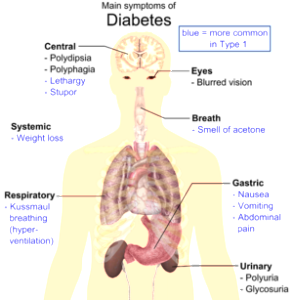 Diabetes mellitus (diabetes) is a chronic condition characterized by high blood glucose level (hyperglycemia) with typical manifestations of thirst, polyuria, polydipsia, and weight loss (Rother 2007). There are 171 million people worldwide suffering from diabetes in 2000 according to World Health Organization (WHO) statistics and this number would be more than double by 2030 (WHO 2008). The disease is responsible for 3.2 million deaths every year (WHO 2008).
Diabetes mellitus (diabetes) is a chronic condition characterized by high blood glucose level (hyperglycemia) with typical manifestations of thirst, polyuria, polydipsia, and weight loss (Rother 2007). There are 171 million people worldwide suffering from diabetes in 2000 according to World Health Organization (WHO) statistics and this number would be more than double by 2030 (WHO 2008). The disease is responsible for 3.2 million deaths every year (WHO 2008).
It is caused by defects in insulin-mediated signal pathways, resulting in decreased glucose transportation from blood into muscle and fat cells. The major risk is vascular injury leading to heart disease, which is accelerated by increased lipid levels and hypertension. Management of diabetes includes: control of blood glucose level and lipids; and reduction of hypertension. Dietary intake of beta-glucans has been shown to reduce all these risk factors to benefit the treatment of diabetes and associated complications. In addition, beta-glucans also promote wound healing and alleviate ischemic heart injury. Studies have shown that beta-glucans could reduce hyperglycemia, hyperlipidemia, and hypertension. Thus, beta-glucan could produce new approaches for the treatment of diabetes.
SOURCE:




